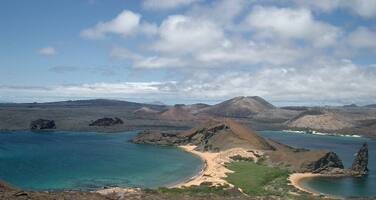Galápagos Islands
Factors affecting the property in 2003*
- Financial resources
- Fishing/collecting aquatic resources
- Illegal activities
- Impacts of tourism / visitor / recreation
- Invasive / alien marine species
- Invasive/alien terrestrial species
- Management systems/ management plan
Factors* affecting the property identified in previous reports
- Fire (issue resolved);
- Need of a special law (issue resolved);
- Limited protected area (issue resolved);
- Over fishing;
- Tourist pressure;
- Lack of financial resources;
- Lack of legal and physical enforcement;
- Illegal fishing and poaching;
- Invasive species
International Assistance: requests for the property until 2003
Total amount approved : 567,850 USD
Missions to the property until 2003**
June 1996: fact-finding mission; February-March 2003: UNESCO mission within the framework of the UNESCO/UNF Galápagos Project
Conservation issues presented to the World Heritage Committee in 2003
WHC:
Under the UNESCO/UNF Galápagos Project, UNESCO carried out a mission from 20 February to 4 March 2003. The mission report states that the project has significantly contributed to capacity building to undertake future prevention of introductions of new species, as well as the control and eradication of existing invasive species. Additionally, there has been progress in raising scientific attention and public awareness to the problems related to introduced species. In particular, the project included training of students, establishment of networks among scientists, and dissemination of information through conferences, publications and a website. The project requires that US$ 1 million be raised towards a trust fund aimed at providing stable financing for combating threats to Galápagos biodiversity. UNF would match the US$1million. Efforts are behind schedule and the target has not yet been achieved. The Centre will submit the full mission report to the Committee. Other notable points:
As was urged by the Committee in 2001 and 2002, nearly all regulations have been passed under the Galápagos Special Law. These include i) Small fisheries, ii) Tourism, iii) Disposal of Solid Waste, iv) Quarantine and v) Introduced Species. GEF financing (US$18.3million) started flowing in 2002, focusing on control of introduced species. Field work on goat eradication is expected to begin in June – this is the largest island world wide from which goats will be eradicated. A new director was appointed to the Galápagos National Park Service in February 2003, though he submitted his resignation on 23 April. The first attempt at biological control in Galápagos continued – after extensive multi-year tests and trials, an Australian species of ladybird beetle has been released on many islands in an effort to limit the damages caused by the cottony cushion scale, a plant parasite seriously affecting mangroves and other native and endemic plants. WWF and the Ecuadorian Government signed an agreement to transform the Galápagos Islands into a model for 21st century clean energy use within a timeframe of the next ten years. WWF reports that several projects and investments of approximately US$ 25 million will aim at creating a renewable, non-polluting energy supply for the Islands. On 19 March 2003, the National Park authorities captured a boat that was illegally fishing sharks in the Galápagos Marine Reserve – the boat crew had caught 75 sharks. IUCN is concerned about the continuing threat illegal fishing represents for marine biodiversity in National Park waters.
Summary of the interventions
Decisions adopted by the Committee in 2003
27 COM 7B.25
Galápagos Islands (Ecuador)
The World Heritage Committee [15],
1. Notes that over the past few years, the State Party, through its Galápagos National Park Service, and the Charles Darwin Foundation have undertaken new and expanded responsibilities in the areas of marine conservation and the control of introduced species;
2. Welcomes the efforts by the State Party to support the ongoing strengthening of the Special Law for Galáapagos;
3. Commends the authorities for pursuing programme development in areas critical to the conservation of this property, including the establishment of a Galápagos quarantine system;
4. Commends the State Party for having passed several regulations in 2002, including the regulation on quarantine and on introduced species;
5. Encourages the State Party to pass the final regulations under the Special Law for Galápagos;
6. Urges the State Party to maintain all efforts related to the control of illegal fishing in the Galápagos Marine Reserve.
[15] Decision adopted without discussion.
Draft Decision: 27 COM 7 (b) 25
The World Heritage Committee,
1. Notes that over the past few years, the State Party, through its Galápagos National Park Service, and the Charles Darwin Foundation have undertaken new and expanded responsibilities in the areas of marine conservation and the control of introduced species,
2. Welcomes the efforts by the State Party to support the ongoing strengthening of the Special Law for Galapagos,
3. Commends the authorities for pursuing programme development in areas critical to the conservation of this site, including the establishment of a Galápagos quarantine system,
4. Commends the State Party for having passed several regulations in 2002, including the regulation on quarantine and on introduced species,
5. Encourages the State Party to pass the final regulations under the Special Law for Galápagos,
6. Urges the State Party to maintain all efforts related to the control of illegal fishing in the Galápagos Marine Reserve.

Exports
* :
The threats indicated are listed in alphabetical order; their order does not constitute a classification according to the importance of their impact on the property.
Furthermore, they are presented irrespective of the type of threat faced by the property, i.e. with specific and proven imminent danger (“ascertained danger”) or with threats which could have deleterious effects on the property’s Outstanding Universal Value (“potential danger”).
** : All mission reports are not always available electronically.

